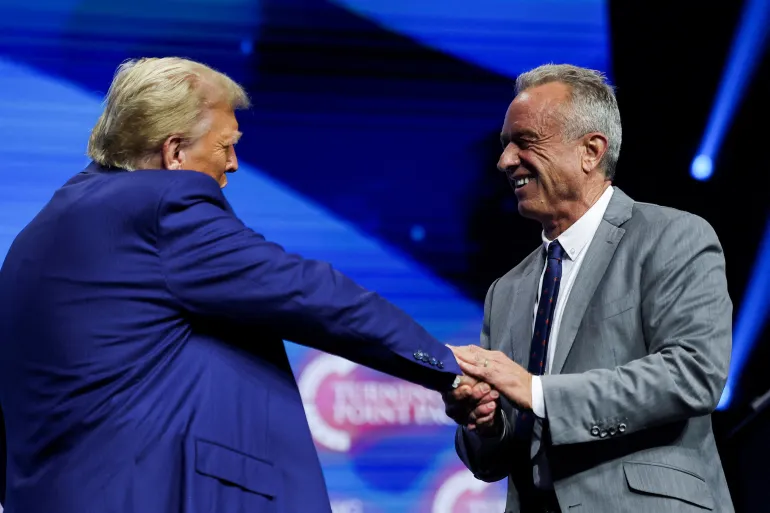President-elect Donald Trump’s recent nominations for key health-related positions have raised significant questions about the future regulatory and operational landscape for pharmaceutical companies. These appointments, particularly those of vaccine skeptics Robert F. Kennedy Jr. as Secretary of Health and Human Services (HHS) and Dr. Dave Weldon to head the Centers for Disease Control and Prevention (CDC), signal potential changes in the federal government’s approach to healthcare and drug policies.
Key Appointments and Their Significance
- Robert F. Kennedy Jr. (Secretary of HHS):
- Kennedy is a well-known critic of vaccines, having questioned their safety and efficacy for years. His leadership at HHS may lead to:
- Increased scrutiny of vaccine approval processes and post-market surveillance.
- Heightened public discourse around vaccine mandates, potentially influencing national vaccination strategies.
- Policy shifts that could place additional regulatory burdens on vaccine manufacturers like GlaxoSmithKline (GSK) and Pfizer.
- Kennedy is a well-known critic of vaccines, having questioned their safety and efficacy for years. His leadership at HHS may lead to:
- Dr. Dave Weldon (CDC Director):
- Weldon’s views align with Kennedy’s skepticism toward vaccines. Under his leadership, the CDC may prioritize investigations into vaccine safety and adverse events.
- The agency’s public health messaging could shift, potentially impacting vaccination rates and public trust in immunization programs.
Impacts on Pharmaceutical Companies
Vaccine Manufacturers
- Market Volatility:
- Companies such as GSK, Moderna, and Pfizer may experience increased market uncertainty as public discourse around vaccine safety intensifies.
- Regulatory Oversight:
- Stricter oversight of vaccine trials and post-approval monitoring could lead to delays in product launches, impacting revenues.
- Public Perception:
- A potential erosion of public trust in vaccines may reduce demand, especially for routine immunizations and newer vaccine platforms.
Weight-Loss Drug Producers
- Scrutiny of GLP-1 Drugs:
- Producers of GLP-1 receptor agonists, including Novo Nordisk (Ozempic) and Eli Lilly (Mounjaro), are likely to face policy discussions on drug pricing and accessibility.
- Kennedy has previously criticized the high costs of these medications, suggesting potential efforts to cap prices or negotiate Medicare coverage terms.
- Market Implications:
- Shares of these companies have already faced volatility amid concerns that the new administration might challenge the widespread use and cost structures of these high-demand drugs.
Broader Pharmaceutical Sector
- Drug Pricing Regulations:
- Both Kennedy and Trump have voiced support for lowering prescription drug prices. This could result in:
- Expanded Medicare negotiation powers.
- Pricing transparency initiatives.
- Increased competition through the acceleration of generic drug approvals.
- Both Kennedy and Trump have voiced support for lowering prescription drug prices. This could result in:
- International Pharmaceutical Companies:
- European-based companies like Novo Nordisk are exploring strategies to mitigate potential impacts, including:
- Expanding U.S. manufacturing operations to avoid tariffs and align with potential domestic manufacturing incentives.
- Considering mergers and acquisitions to bolster their presence in the American market.
- European-based companies like Novo Nordisk are exploring strategies to mitigate potential impacts, including:
Potential Industry Shifts
- Manufacturing Relocation:
- Pharmaceutical companies may shift production to the U.S. to address potential trade barriers and take advantage of domestic incentives under the new administration.
- Investment in Innovation:
- Companies are likely to invest heavily in R&D for non-controversial therapies to diversify revenue streams and reduce reliance on drugs that may face regulatory challenges.
- Increased Lobbying:
- The pharmaceutical industry is expected to ramp up lobbying efforts to counter potential pricing reforms and safeguard market dynamics.
Broader Implications for Healthcare Policy
- Focus on Healthcare Costs:
- Trump’s administration has indicated an interest in reducing overall healthcare expenditures, potentially reshaping the balance between innovation incentives and affordability.
- Public Trust:
- The appointments of vaccine skeptics to high-profile roles could influence public confidence in health policies and medical interventions, requiring companies to invest more in public education and trust-building initiatives.
Conclusion
Trump’s healthcare appointments suggest a paradigm shift in how the federal government will engage with the pharmaceutical industry. For vaccine manufacturers and producers of high-profile drugs like GLP-1 agonists, the focus on pricing, regulation, and public perception poses both challenges and opportunities. Companies will need to navigate this evolving landscape with agility, focusing on innovation, transparency, and strategic market positioning to thrive in an increasingly complex regulatory environment.





